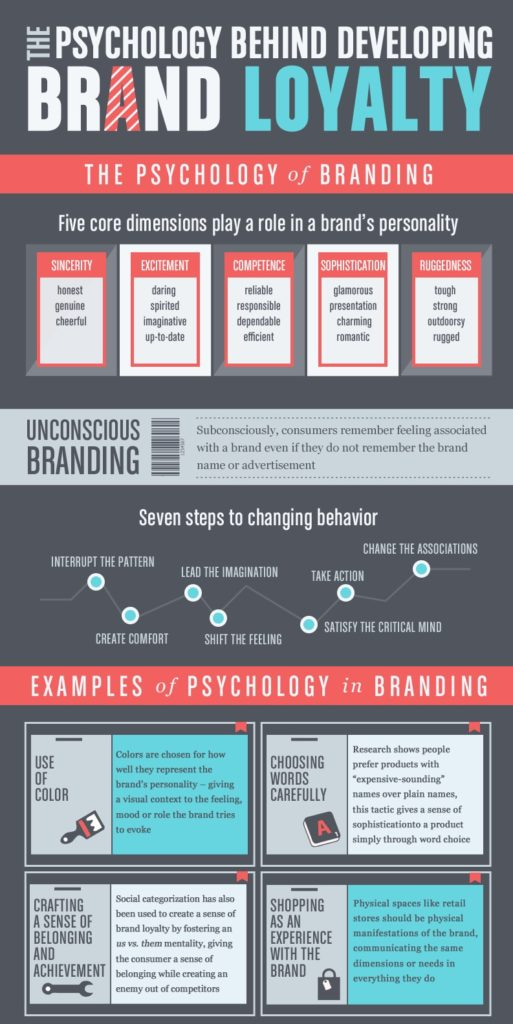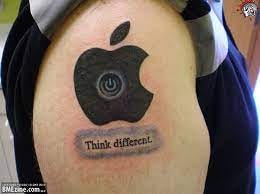BRAND WHORES: THE CURIOUS CASE OF CONSUMER LOYALTY
About 12 years ago I was at a fabulous dinner party. As one does, I was mingling about and unexpectedly ran into an old friend (let's call him Kevin). I hadn't seen him in a while and we started catching up. Toward the tail end of the conversation, he told me he'd gotten a new tattoo and asked if I wanted to see it. “Sure,” I said while he was already eagerly rolling up his sleeve. Beaming with pride and adorned with a Cheshire-cat wide grin, he triumphantly raised his inner forearm and exclaimed, “Isn't it amazing?”
It took me a moment to mentally process what I was seeing while simultaneously slipping into my well-practiced “poker face mode.” There before me, indelibly and forever inked into the epidermis of my buddy's arm, was the Apple corporate logo. Huh? In my most genteel manner I inquired, “Cool! Do you work for Apple now?” “Nope,” replied Kevin. “Oh, so you're a shareholder then?” Again, another negative. “Okay, help me understand your thought process on this, Kevin,” said I while thinking to myself, “What the shit has this dude done? Even Steve Jobs never got a goddamned Apple tattoo.”
I honestly wish I could say that this was my first experience with someone's volitional over-self-identification with a corporation, but it was not. While not indigenous to Southern California, this ludicrous phenomenon is certainly rampant there. Whether it was guys with an all encompassing Nike “Swoosh” or Monster Energy Drink's claw-like “M” decal on the back windows of their vehicles or the egregiously obvious display of designer names on women's clothing or handbags, I always found this both fascinating and repugnant. What am I missing? Why would anyone ever desire to align their individual identity with a manufacturing company?
EVER GET THE FEELING YOU'VE BEEN CHEATED?
Having worked for a national marketing agency, I already know the answer to my question. Ever since the early 70s marketing psychologists have been aware that lifestyle has a profound impact on consumer behavior and brand preference and that consumers choose brands that are appropriate for their self-image. As such, companies intentionally attempt to position themselves to fit with that lifestyle.
More frighteningly, consumers use brands as a means of self expression and a lifestyle or value signal. The psychological concept here is known as social proof – the notion that humans look around them to make decisions. This “looking” is now massively accelerated with the prevalence of social media and the internet in general. This has resulted in what amounts to a preposterous positive reinforcing feedback loop or “signaling-fest."
Moreover, the ability to create one's identity from scratch is now a very real possibility and many people are in the business of doing just that. But in a number of cases, that identity isn't an outward expression of one's own unique, refined values, but based on the strategically designed ones of a global enterprise which becomes a proxy of sorts for the absence of personal ones. Why do people do this? Largely because of the psychological evidence that buying certain brands helps people “reduce discrepancies between their actual and ideal self, thereby increasing their self-esteem. It's now been shown that this self congruity is a major factor in brand loyalty” (Redmond, 2017).
“Your future dream is a shopping scheme.” Yep, the Sex Pistols nailed it all the way back in 1977.
EXAMINING MY OWN BRAND LOYALTY
I identified this topic as a potential article a while ago and have since been pondering my own affinity for particular brands and the level of my associated loyalty. In brief, my general purchasing behavior is nearly exclusively driven by value. Ideally, I want the highest quality for the lowest price and when I find it, I usually buy it, irrespective of the manufacturer. Nevertheless, I discovered that if there are multiple choices in the value proposition, I will default to specific brands.
This, of course, got me on the path of exploring what makes me fond of any particular brand. Have I fallen prey to the artful psychological atmospherics of a masterful Chief Marketing Officer who's invested hundreds of millions in crafting lifestyle or values beacons that possess a gravitational pull on the intentional construct of my self-identity?
Nah. But what I did find is that any predilection I have for a brand is almost always based on quality. Quality here is defined by performance and reliability in personal, real-world circumstances. For example, I tend to prefer Shimano fishing reels and rods because I have used (perhaps abused is more appropriate) them for decades in all manner of conditions and they continue to perform. More so, I have intentionally attempted to damage them in extreme situations and they keep on truckin'.
So when it's time to acquire new gear, my first inclination is Shimano. Does that mean that Daiwa or Okuma have inferior products. Nope and I own some of them as well. But if you're a new angler and ask me for my opinion, I'll always mention Shimano first. This is the same for the few other brands I favor like Ibanez bass guitars.
BLURRED LINES
What about a circumstance where brand loyalty and/or self-identification is based not on carefully contrived corporate values or lifestyle beacons, but on those that are entirely imposed or projected by the individual consumer? Is that even possible? The short answer here is yes. At least for me. Let's take a closer look at this idiosyncratic phenomenon.
Outdoor apparel manufacturer, Patagonia, based in Ventura, California is a brand I happen to consistently patronize. One glance at their website depicts a quintessential example of superbly executed values and lifestyle beaconing. There is no missing the espousing of and documented commitment to environmental activism – everything from politics, to sustainable energy, to land stewardship, social responsibility, and authentic “do-goodery” is crisply showcased here.
From a marketing psychology perspective, it does not get much more artful than this. In addition, they make being outdoors look like a whole lot of fun. They even do a solid job at highlighting the high-quality of their product. It is this last reason why I've been a lifelong customer. No joke, I have a Patagonia jacket my parents bought me when I was 16 years old and I still wear it today. Moreover, despite literally decades, it still looks great and has not lost one stitch (and if it did, I could send it back to Patagonia and they would repair it for free). Basically, as a result of this very example they are my gold standard for quality as defined above.
And while their product quality is spectacular, there are likely many other companies who manufacture at similarly insane quality levels. So why, do I continue to buy from Patagonia? Here's the real answer. Because having grown up in the Santa Barbara area, I consider them a hometown company. And being loyal to my homies is a core part of who I am. That is my own, very personal value that I have superimposed on the company and has nothing at all to do with their prevailing, and very compelling, marketing scheme.
WAIT, AM I A BRAND WHORE?
Exploring this knotty topic gave me a tremendous opportunity to think long and hard about my own behavior as it concerns brand self-identification and consumer loyalty. Initially, I thought it would be a rather swift exercise as I have always been a stalwart proponent of never, ever allowing myself to be an active, or even tacit, vehicle for corporate advertising.
This began in my early punk days and has continued unabated ever since. Specifically, I will not buy or wear any item that visibly displays the name of the manufacturer, irrespective of whether I like the brand or not. Even to the point of taking hours to remove small tags cleverly integrated into the item (sorry Patagonia), or worst case, black it out with an indelible marker. Okay, I've not de-badged my cars, or scraped the vinyl lettering from my kayaks, but you get where I'm coming from. The bottom line is, I simply will not whore myself out by being a walking billboard - for anybody.
However, isn't the very nature of that activity a form of identity signaling itself? Of course it is. I am able to reconcile this behavior because I view it as a manifestation of my personal values, not someone else's and certainly not a global corporation's. One must consistently uphold standards of personal integrity, right?
As I fell further down the rabbit hole of my thought process, I happened upon a somewhat interesting discovery. That being while I am adamant about not being a shill for commerce, I will absolutely do so for art. For example, most of my adolescence and early adulthood was spent wearing band t-shirts. From my perspective at the time (and even now), wearing a band shirt was less about advertising my association and affinity for the band and far more about actively advertising their art.
In my opinion, more of the world needed to know about and listen to the likes of Alien Sex Fiend, Virgin Prunes, Echo & the Bunnymen, and Placebo (still do) and by wearing their shirts I was, in effect, spreading the gospel of fine music. The efficacy of this behavior remains highly questionable, but I view this more as me pimping great art rather than selling myself out, but in reality that coin could very easily be flipped.
A MUG'S GAME
Exploring all of this has certainly been an intriguing exercise and I'm not quite sure where I've landed. Honestly, I'm a bit polarized. Part of me wants to throw up in my mouth a little knowing that so many humans have become willing dupes who volitionally over-self-identify with somewhat disingenuous (or outright bogus), but very shrewdly developed corporate values, rather than their own. The other part, specifically the one that owns these companies and stands to personally profit from said behavior, believes that everyone should have an Apple logo tattooed on their forearm.
Oh, speaking of Apple tattoos, I just verified that if Kevin had bought Apple stock instead of a now faded ink stain, he'd have netted over $11,000. Think different, indeed!






